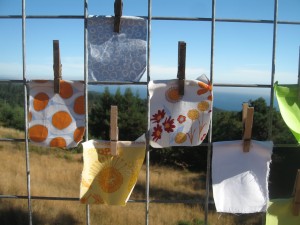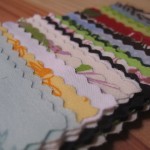 Sometimes the challenges of the planet seem too big, too complex. What can I do? What is my role to play? My late friend, John Armer, used to say, “Our job is to leave the sandbox cleaner than when we found it.” I have always liked this simple yet poignant saying.
Sometimes the challenges of the planet seem too big, too complex. What can I do? What is my role to play? My late friend, John Armer, used to say, “Our job is to leave the sandbox cleaner than when we found it.” I have always liked this simple yet poignant saying.
I am a textile designer by trade. For years, I designed products for mass markets — Walmart, Target, etc. I loved my job. Creating patterns and designs is total joy for me. In 2004, I got a call from a competitor who wanted me to come work for them.However, I couldn’t do it. It didn’t feel right. It felt like a step sideways. It was a blessing though, because it got me thinking. What is the next step? What does it look like?
It was around this same time that I walked into a mass market store and found a sea of check-out stands, all filled with customers, all with baskets filled with stuff. All I saw was a glacial-size flow of landfill. Cheap stuff to be enjoyed briefly and then discarded. It was in that moment that it hit me—I was making pretty landfills for a living!
Determined to have my life’s work be something I could be proud of, it was on that day that I started down the road that would ultimately lead to the creation of Harmony Art Organic Design — an independent, printed organic fabric company. I am happy to report that six and a half y ears later, colorful printed organic cotton is no longer an anomaly but a growing market segment.
ears later, colorful printed organic cotton is no longer an anomaly but a growing market segment.
It is my sincere belief that for the “sandbox” to get collectively cleaner (or remain dirty and continue to inherit more debris) there is a magic shovel. No, I can’t solve poverty, climate change, financial exploitation, or war. What I can do (and what everyone on the planet can do) is to look at my own life. What contribution am I making with my life’s work? What about your contribution? I made the decision to walk away from a steady paycheck to create a new, healthier fabric option for people and businesses. I don’t expect you to quit your job and start your own company — that’s extreme. But I do think if we each took a good hard look at the results of our life’s work, and simply focused on creating the best possible product (or outcome) for the world, the change would be explosive and powerful.
People love to blame multinational corporations for the state of things, but the reality is that those same multinational corporations became rich and powerful because we supported them. We love to play the victim to big business, but they didn’t get that way overnight or by happenstance. We bought, and continue to buy, their “goods” — GMO food; petroleum-based, single-use plastic; over-packaged, disposable, landfill-bound, polluting stuff. Our daily purchases are a “yea” vote for the way they conduct their businesses. If we don’t like the way they do business, we have to take some personal responsibility and stop supporting them. Your purchases (as well as the choice to not purchase) are FAR more powerful than you realize. Your purchasing decisions are the magic shovel. You can use the shovel to fill the sandbox with cheap, exploitive crap or thoughtful, healthy, sustainable sand. The choice is yours.
Harmony Susalla walked away from a successful career designing commercial textiles to help inspire big change in the way textiles are grown and processed. Organic fabric had historically been beautiful shades of oatmeal and granola. Harmony helped change that by infusing color and design with environmentally sensitive inks and dyes. Her designs are inspired by nature and her business is motivated to protect it. Over 200 companies have chosen to use Harmony Art Organic fabrics in their product lines.
Love Harmony and her fabric, it is amazing!
We love her too!
You are one of my “she”ros! Thank you for setting such a great example of what’s possible: entrepreneur, doing what you love in an earth friendly way. What could be better than that! Keep leading!
Kai
Thank you for sharing your story. We as entrepreneurs can make such a huge impact to our planet and for our customers creating and doing what we love as artist.
Hey Maggie, Thank you so much for your comment. Tell your friends about Women Of Green!
Thank you for setting the pace. I am a textile designer since the 1960, and nearly gave up this vocation for the same reasons. I take heart. Alas, all textile consumption, be it driven by agro chemistry or organic methods, its scale must yield to mindful consumption, as in slow cloth.
I am a textile designer since 1966, designing apparel since the 80’s. I nearly gave up my vocation in arts and industry for the same reasons. Thanks for making your move Harmony! Eventually the shift from all consumerism must happen to mindful consumption, that means recycling fibers, thread and cloth the way Japanese weavers did, when NO virgin (cotton) fiber was available.